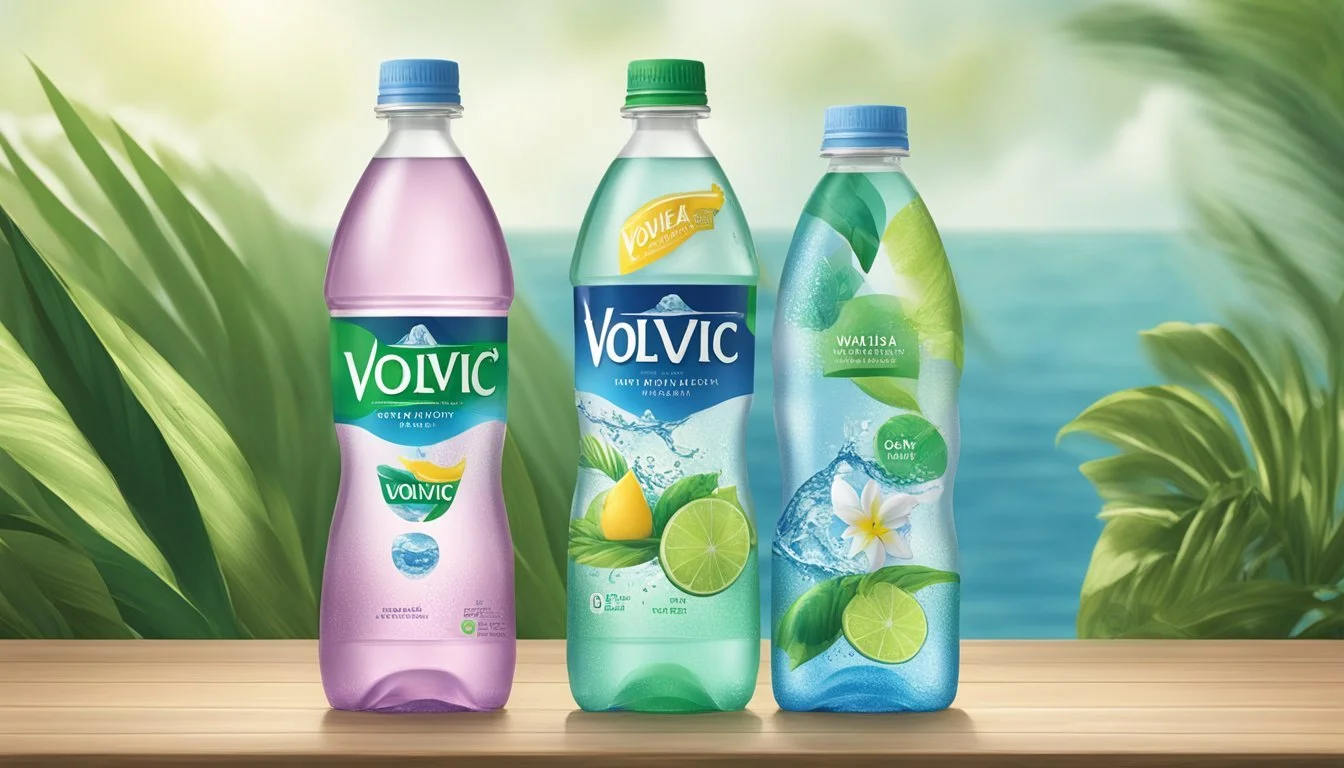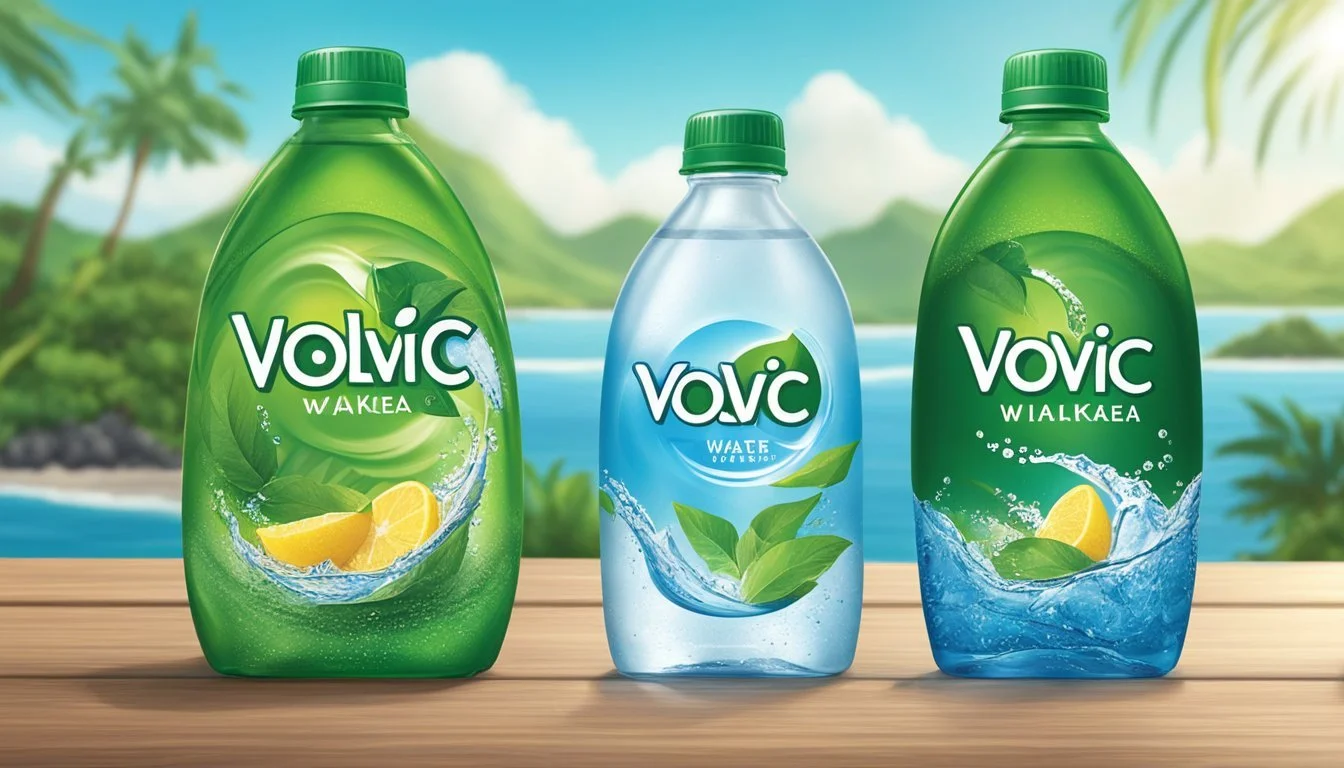Volvic vs. Waiakea
Comparing Purity and Taste
When it comes to premium bottled water, the choices can seem overwhelming. Volvic and Waiakea are two brands that stand out for their distinct origins and qualities. Waiakea water, sourced from a volcanic well in Hawaii, offers naturally alkaline properties with a pH range of 7.6 to 8.2, ensuring purity and a unique mineral composition. This makes it appealing for those looking for more than just hydration.
On the other hand, Volvic, hailing from the volcanic region of France, is celebrated for its clean taste and balanced mineral content. Its filtration through volcanic rocks infuses the water with essential minerals while maintaining a neutral pH. This provides a crisp and refreshing option suitable for daily consumption.
For consumers seeking both health benefits and environmental consciousness, Waiakea takes an edge by being the first US bottled water to achieve Carbon Neutral certification. This dedication is coupled with their commitment to donating over 5% of revenue to global nonprofits. Whether prioritizing mineral-rich alkalinity or supporting sustainable practices, the choice between Volvic and Waiakea ultimately depends on individual preferences and values.
Comparing Water Sources
Volvic and Waiakea both tout volcanic origins, but they source their water from different locations with unique characteristics. Understanding these distinct sources helps to appreciate the inherent qualities of each brand.
Volvic's Volcanic Source
Volvic sources its water from the Auvergne region in France, specifically from the volcanic landscape of the Chaîne des Puys.
Natural Spring Water: The water is naturally filtered through six layers of porous volcanic rock over several years.
Mineral Composition: This natural filtration process imparts minerals like silica, calcium, and magnesium to the water.
Volvic's approach ensures a consistent and pure source, maintaining natural water attributes without additional processing.
Annual Precipitation: The region receives abundant rainfall, which replenishes the aquifer and sustains the water table. These combined factors contribute to Volvic’s reputation for purity and mineral-rich content.
Waiakea's Mauna Loa Source
Waiakea, sourced from the Mauna Loa volcano in Hawaii, distinguishes itself with its volcanic origins.
Mauna Loa Volcano: Waiakea’s water begins as snowmelt and rainwater, which travel through 14,000 feet of volcanic rock.
Alkaline Properties: The extended filtration imparts natural alkalinity, resulting in a higher pH range of 7.6 to 8.8. This property helps neutralize acidity in the body.
Mineral Content: The filtration process also enriches the water with essential minerals like potassium, calcium, and magnesium. These characteristics contribute to Waiakea's freshness and purity, offering a distinct taste compared to other natural spring waters.
Environmental Commitment: Waiakea emphasizes sustainability by being certified Carbon Neutral, highlighting their dedication to both quality and environmental responsibility.
Health and Environmental Impacts
When considering bottled water options, it’s crucial to examine both the health benefits provided by their mineral content and the environmental practices related to their production and packaging.
Mineral Content and Health Benefits
Volvic is known for its mineral-rich profile, stemming from its volcanic origins. It contains beneficial minerals like magnesium, calcium, and potassium. These minerals contribute to hydration, support bone health, and aid muscle function.
Waiakea water also offers health benefits with its naturally occurring alkaline pH of 8.8. The high pH helps neutralize acidity in the body. Rich in electrolytes, Waiakea water contains silica, which promotes skin health, joint function, and overall well-being. Both brands provide essential minerals, but the alkaline properties of Waiakea might offer additional benefits for those looking to balance their body’s pH levels.
Sustainable Practices and Packaging
Waiakea adopts several sustainable practices, positioning itself as an environmentally conscious brand. It is sourced from a naturally renewable aquifer with a 1.4 billion gallon recharge rate. Their bottling facility utilizes 33% renewable energy. Additionally, it is certified Carbon Neutral and donates 5% of its revenue to nonprofits.
Volvic emphasizes its natural purity and also prioritizes sustainability. It is packaged in bottles made from recyclable materials. This reduces its carbon footprint. Volvic works on water source preservation and responsible land use around its spring.
Both brands are committed to sustainability, but Waiakea stands out with its renewable resource management and strong environmental initiatives. The choices made by each company highlight a commitment to reducing their impact on the planet while providing high-quality water.
Physical and Chemical Properties
Volvic and Waiakea waters exhibit distinct physical and chemical properties that appeal to different preferences. These include variations in pH levels, alkalinity, and unique taste profiles influenced by their sources.
PH Levels and Alkalinity
Waiakea water boasts a naturally high alkaline pH of 7.6 to 8.8, sourced from volcanic water in Hawaii. The higher pH contributes to the body's neutralization of acidity, supporting optimal function.
Volvic, sourced from volcanic regions in central France, presents a neutral pH around 7. While not as alkaline as Waiakea, Volvic's pH level offers a balanced and refreshing hydration option. The higher alkalinity in Waiakea may be a key consideration for those seeking alkaline water for its purported health benefits.
Taste Profile
Waiakea water's alkaline nature gives it a smooth and silky mouthfeel. The unique mineral composition, including electrolytes and essential minerals, adds a slightly sweet taste. This distinct flavor sets it apart as a premium option.
Volvic water is known for its clean, crisp taste. Its minerals impart a subtly refreshing flavor without being overpowering. This makes it an excellent choice for those who prefer a more neutral-tasting water.
Both waters are bottled at their sources, ensuring purity and consistent taste.
Filtration and Purity
Volvic and Waiakea both highlight their filtration processes and purity standards, which is critical for delivering clean, natural spring water. Each brand follows unique purification methods, ensuring contaminant-free and high-quality bottled water.
Natural Filtration Process
Volvic water originates from the natural springs of the Auvergne volcanoes in France. It filters naturally through six layers of porous volcanic rock over several years, enhancing its purity and mineral content. This slow, natural filtration process plays a crucial role in maintaining the water's natural minerals and its clean, crisp taste.
Waiakea water, sourced from a volcanic well in Hawaii, undergoes a unique filtration process. The water is filtered through thousands of feet of porous volcanic rock over approximately 30 days, resulting in a pure, naturally alkaline product. This process adds essential minerals such as silica, making the water beneficial for health.
Contaminants and Purity Standards
Volvic adheres to strict purity standards, ensuring its water remains free from contaminants such as lead and fluoride. The water undergoes regular testing to meet both European and international safety regulations, guaranteeing high purity levels suitable for daily consumption.
Waiakea water also focuses on maintaining purity by strictly controlling possible contaminants. In addition to natural filtration, Waiakea’s bottled water is ionized and tested to be free from harmful substances. The brand uses sustainable practices with BPA-free, 100% recycled plastic (RPET) bottles, supporting both consumer health and environmental responsibility.
Both brands implement rigorous processes to provide clean water, meeting high purity standards and ensuring safety and quality for consumers.
Product Offerings and Brand Differentiation
Both Volvic and Waiakea offer distinct product lines that reflect their unique sources and market positioning. Readers looking to understand the differences in their bottled water varieties and brand presence will find this comparison useful.
Varieties of Bottled Water
Volvic offers a broad range of bottled water products. Its portfolio includes still water sourced from volcanic rock fields in France, which gives it a unique mineral composition. Volvic also provides flavored waters and sparkling waters, catering to diverse consumer tastes.
Waiakea focuses on its naturally alkaline water, sourced from the volcanic regions of Hawaii. The brand emphasizes the natural alkalinity of its water, which typically has a pH between 7.6 and 8.2. Waiakea also offers waters enriched with electrolytes and minerals, providing a slightly sweet taste and smooth mouthfeel.
Below is a comparison table for a quick reference:
Feature Volvic Waiakea Source Volcanic rock fields (France) Volcanic rocks (Hawaii) Varieties Still, Sparkling, Flavored Naturally alkaline Unique Properties Mineral-rich Alkalinity, Electrolytes
Brand Positioning and Market Presence
Volvic positions itself as a premium water brand with widespread availability across multiple continents. It targets a broad market segment by offering various product lines suitable for everyday hydration. The brand’s marketing emphasizes purity and natural sourcing, aligning with environmentally conscious consumers.
Waiakea, on the other hand, markets itself as a luxurious and sustainable brand. Its unique selling proposition lies in its volcanic source and eco-friendly practices, such as being the first US bottled water to achieve Carbon Neutral certification. Waiakea also donates a portion of its revenue to environmental and social initiatives, thereby appealing to ethically-minded consumers.
This brand differentiation highlights Waiakea’s focus on sustainability and quality, while Volvic emphasizes variety and accessibility in its market strategy.
Consumer Experience and Accessibility
When it comes to choosing between Volvic and Waiakea, it's essential to consider how the consumer experiences the product and its availability in the market. Critical factors here include taste, texture, pricing, and accessibility.
Taste and Texture Perception
Volvic's water is known for its consistent taste and smooth texture, sourced from a volcanic source in France. The water's journey through six layers of volcanic rock naturally enhances its mineral content, offering a mild and refreshing flavor that many consumers appreciate.
Waiakea water, sourced from the Mauna Loa volcano in Hawaii, also receives high marks for taste. It passes through 14,000 feet of volcanic rock, infusing the water with natural minerals like silica. This process gives it a distinct, clean, and slightly alkaline flavor, contributing to its reputation for smoothness and a more complex taste profile.
Availability and Pricing
Volvic is widely available in many countries and can be found in numerous retail outlets across various states. It is easily accessible in both large supermarkets and smaller convenience stores. The average cost of Volvic tends to be competitive, making it an affordable option for daily hydration needs.
Waiakea, while not as universally available as Volvic, holds a unique market space with its premium branding. It is often found in specialty stores and health-focused retailers. Waiakea water's pricing reflects its premium quality and environmental focus, typically making it more expensive than Volvic. Given Waiakea's certifications and contributions to nonprofits, many consumers view the higher cost as justified.
Company Ethics and Community Impact
Both Volvic and Waiakea emphasize strong ethical practices, focusing on sustainability and community engagement. They aim to reduce their carbon footprint and ensure transparency in their operations.
Environmental Responsibility
Volvic sources its water from the volcanic region of Auvergne in France, emphasizing responsible extraction practices. The company has initiatives to reduce plastic waste by introducing recycled plastic bottles and promoting large format packaging to minimize single-use plastics. Volvic is involved in reforestation projects to offset its carbon emissions, aiming to achieve a carbon-neutral status.
Waiakea takes an innovative approach by utilizing volcanic filtration through Hawaiian lava to produce naturally alkaline water. Founded with sustainability in mind, Waiakea packages its water in 100% recycled bottles and engages in practices that aim to minimize its environmental impact. The company also offsets its carbon emissions through various environmental programs and partnerships.
Social Initiatives and Transparency
Volvic is committed to supporting communities through programs that provide access to clean drinking water. Partnering with organizations like UNICEF, Volvic helps fund projects that deliver safe water to communities in need. The brand also maintains high transparency regarding its sourcing and business practices, which is pivotal for consumer trust.
Waiakea extends its ethical approach beyond environmental concerns to social initiatives. The company donates a week’s supply of clean water to those in need for every liter sold, focusing on regions with water scarcity. Waiakea ensures transparency in its operations, openly sharing information about its sourcing and production methods, solidifying its reputation as an eco-conscious brand.
Comparison Summary and Recommendations
This section will provide an overview of the key points regarding the quality, value, and reviews from both experts and consumers for Volvic and Waiakea bottled water brands.
Overall Quality and Value
Volvic is sourced from the Clairvic Spring in France, renowned for its volcanic filtration process, which gives it a unique mineral composition. Its pH level is approximately 7, making it neutral and well-suited for daily consumption.
Waiakea is sourced from the Mauna Loa volcano in Hawaii. It boasts a slightly alkaline pH of around 8.2, promoting potential health benefits related to alkalinity. Waiakea emphasizes its sustainable and ethical production practices, using 100% post-consumer recycled (PCR) plastic bottles.
In terms of cost, Volvic tends to be more budget-friendly, whereas Waiakea is positioned as a premium product due to its eco-friendly practices and unique sourcing.
Expert and Consumer Reviews
Experts often highlight Volvic's consistent quality and neutral pH, which make it a dependable choice for hydration. The mineral composition is also appreciated for its balance, affecting taste and potential health benefits positively.
Waiakea receives praise for its sustainability efforts and its higher pH, which some experts associate with better hydration and detoxification properties. Its volcanic source contributes to its distinct mineral profile.
Consumer opinions vary; Volvic is appreciated for its crisp, clean taste and affordability. Negative reviews are rare but some mention the taste being too flat.
Waiakea's consumers value its taste and the brand's environmental commitments. However, the higher price point is a consideration, with some users viewing it as a premium purchase. Negative feedback is minimal but sometimes mentions a preference for a less alkaline taste.
More About Volvic
Mountain Valley Spring Water vs Volvic: Which Bottled Water is Better?
Volvic vs Kirkland Signature: Which Bottled Water is Better?
Volvic vs Richard's Rainwater: Which Bottled Water is Better?
Volvic vs Whole Foods Italian Still Mineral water: Which Bottled Water is Better?
More About Waiakea
Icelandic Glacial vs Waiakea: Which Bottled Water is Better?
Mountain Valley Spring Water vs Waiakea: Which Bottled Water is Better?
Waiakea vs Kirkland Signature: Which Bottled Water is Better?
Waiakea vs Richard's Rainwater: Which Bottled Water is Better?
Waiakea vs Whole Foods Italian Still Mineral water: Which Bottled Water is Better?






